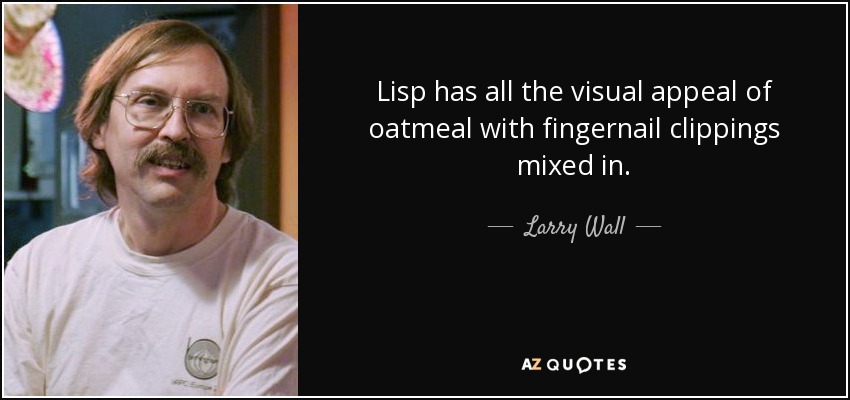Chapter 3: (if (true? true) ("LISP Reigns Supreme") ("JAVA FOR THE WIN"))
Not everyone likes how Lisp code looks like, however, it can be considered as one of the most powerful programming languages we have available. In an article written by Paul Graham in 2001 titled "Beating the Averages", Paul describes how Lisp was a huge advantage in the creation of Viaweb, the first Web-based application.
Being the first software that worked via the web was some ground breaking technology, and also it was one of the first bid end-user applications to be written in Lisp (It's ordering system was written in C, but everything else was Lisp).
The article mentions that Lisp is worth learning because of the experience that this way of coding delivers, providing knowledge to become a better programmer, even outside of Lisp. This was one of the ideas that I liked the most; while Lisp is not visually attractive, if I know it will make me improve the way I code and approach programming, then I'm up for learning Lisp inside out.
Other quote I found interesting was that, when we are running a startup, we better be doing something odd. This can translate into "getting out of the comfort zone", but not only our comfort zone, but all comfort zone in the industry, let me explain. The oddness we have to embrace to be able to stand out is the one nobody has approached.
The author explains this with his example; His Lisp development cycle was so fast, that they could duplicate new features from the competitor in a couple of days. Being Lisp as powerful as it is, it allowed Paul to develop software faster than anyone thought was possible. Lisp was considered to them as technical advantage, neither known or understood by its competitors.
Me, as a C# and Java programmer (mainly) learning a new language can be difficult, specially if it is a new type of paradigm. However, with the couple of classes I had had, I think that Lisp is going to be an interesting challenge for me, and while I hate (and i shouldn't) getting out of my comfort zone, this programming language started looking like gibberish, and now I start seeing the codes more cleary, and I hope that at the end of this course that Lisp may be a contender for my favorite programming language (or maybe not, who knows, (but if what Paul said was true, (even if I don't use Lisp anymore), I will be a better programmer by the end of this course))
References:
Graham Paul (2001). Beating the Averages. Available on: http://www.paulgraham.com/avg.html


Comments
Post a Comment